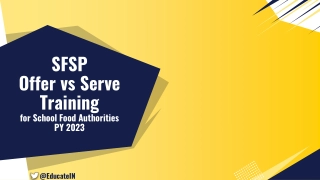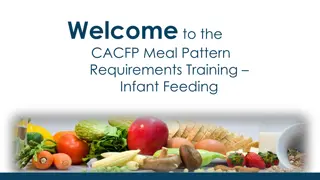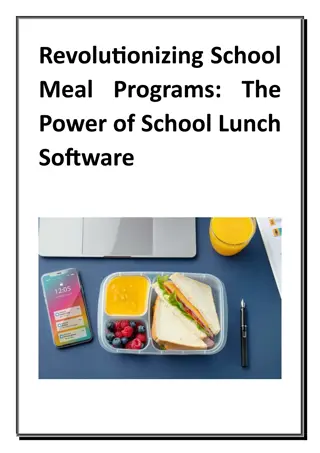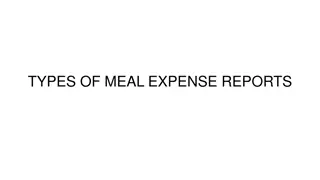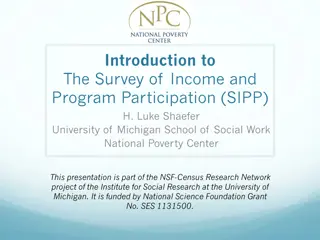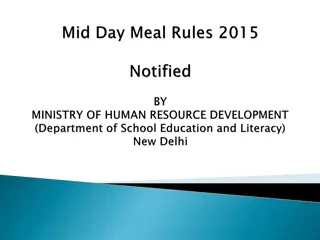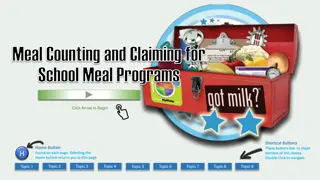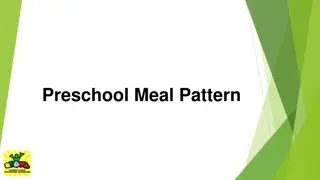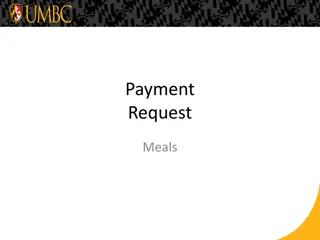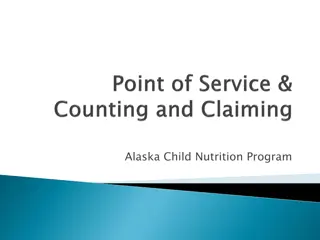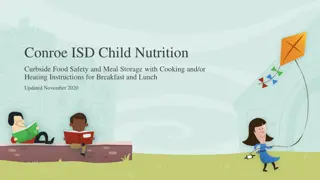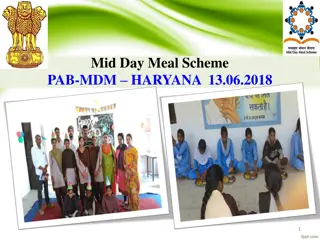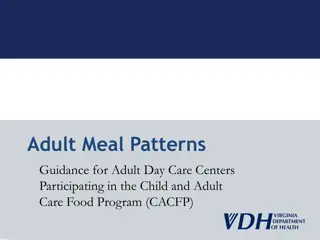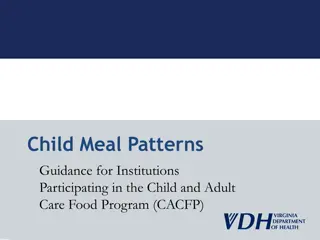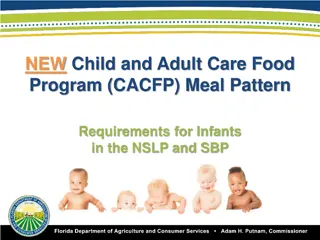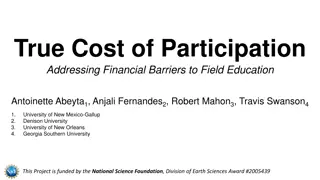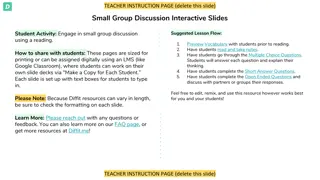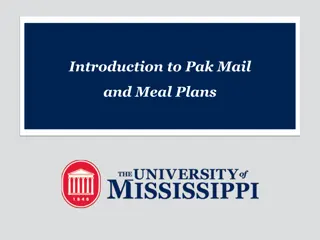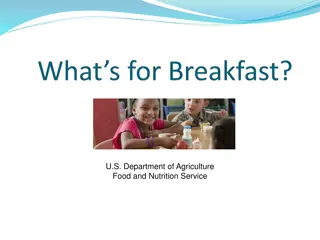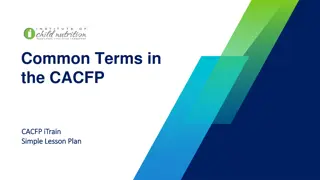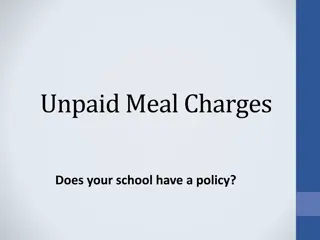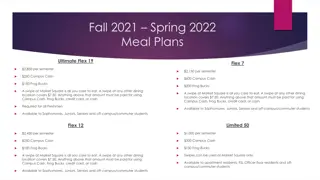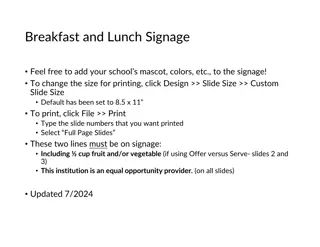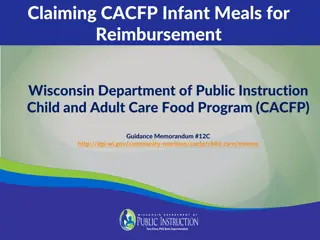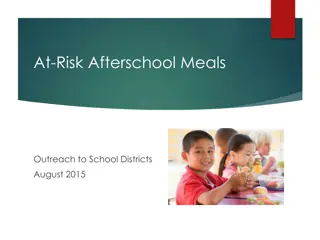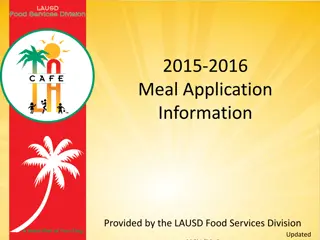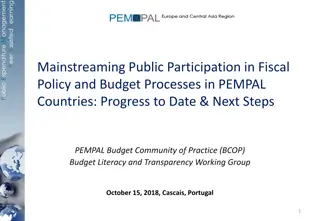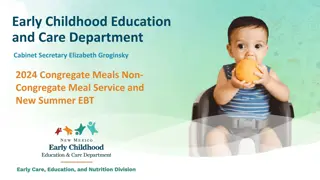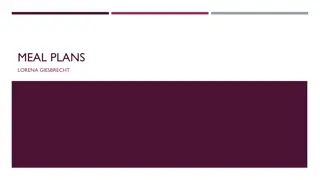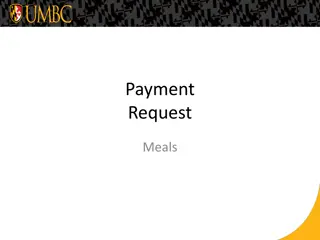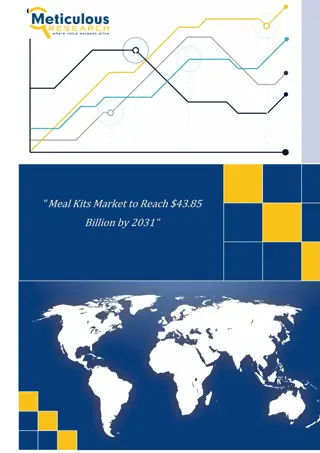Offer vs. Serve Training for School Food Authorities
Learn about Offer vs. Serve (OVS) meal service option for School Food Authorities, allowing children to decline some food items in reimbursable meals. Discover how OVS reduces food waste and costs with proper implementation. Training is essential for staff to assist children in selecting a reimbursa
1 views • 39 slides
CACFP Infant Feeding Meal Pattern Requirements Training Overview
The training material covers the Child and Adult Meal Pattern Requirements, emphasizing a wider variety of protein options, more fruits and vegetables, whole grains, and less added sugar and saturated fat. It details the Infant Meal Pattern Requirements, encouraging breastfeeding and promoting devel
2 views • 58 slides
Revolutionizing School Meal Programs - The Power of School Lunch Software
Are you ready to transform your school meal program? Discover the power of school lunch software and take the first step towards a more efficient and nutritious dining experience for your students. Contact us today to learn more and schedule a demo. Let's work together to revolutionize your school's
0 views • 4 slides
Understanding Offer Versus Serve (OVS) Training for School Food Authorities
Offer Versus Serve (OVS) is a meal service option available for approved School Food Authorities (SFAs) in the Summer Food Service Program (SFSP). OVS allows children to decline certain meal components, reducing food waste and costs when properly implemented. However, it is crucial to adhere to meal
0 views • 41 slides
Understanding Deminimus Meal Expense Reports
Deminimus meal expense reports play a crucial role in documenting and justifying meal expenses incurred in business settings. These reports cover various types of meals, such as local, entertainment, and deminimus events, outlining the guidelines and procedures for creating and documenting expenses.
0 views • 28 slides
Introduction to the Survey of Income and Program Participation (SIPP)
The Survey of Income and Program Participation (SIPP) is a nationally representative, longitudinal survey providing data on income dynamics, government program participation, and social contexts of U.S. households. The SIPP aims to evaluate annual and sub-annual changes in income, program participat
0 views • 27 slides
Mid-Day Meal Rules 2015 under National Food Security Act
The Mid-Day Meal Rules 2015 under the National Food Security Act mandate that every child aged 6 to 14 attending school shall receive a nutritious meal free of charge. The rules specify the entitlement, preparation, and quality standards for meals served in schools. The State Steering-cum-Monitoring
0 views • 17 slides
Meal Counting and Claiming for School Meal Programs
Participants in this course will learn about the essential elements of an acceptable meal counting and claiming system for school meal programs. Topics covered include eligibility documentation, collection procedures, point of service meal counts, reports, claims for reimbursement, and internal cont
0 views • 21 slides
Preschool Meal Pattern Guidelines
Learn about the importance of serving reimbursable meals in preschool programs, following federal requirements for reimbursement. Understand the components that make a meal reimbursable and the consequences if any components are missing. Explore the meal patterns for preschool breakfast and lunch, i
0 views • 21 slides
UMBC Meal Request Guidelines
Navigate the meal request process at UMBC with ease. Explore meal policies, reimbursement details, pre-approval forms, and key requirements for catered events. Access training resources and find essential information on employee-only meal payments. Discover how to get reimbursed for meals involving
0 views • 18 slides
Alaska Child Nutrition Program: Meal Counting & Claiming Systems
Explore the Alaska Child Nutrition Program's guidelines on acceptable point of service counting and claiming systems, along with eligibility documentation, meal counts, and reimbursement procedures. Learn about acceptable meal counting systems and the importance of maintaining accurate records for f
1 views • 37 slides
Conroe ISD Child Nutrition Curbside Food Safety Guidelines and Meal Storage Instructions
The Conroe ISD Child Nutrition program provides crucial guidance on food safety practices, meal storage instructions, and heating guidelines for breakfast and lunch items. Parents are urged to ensure meal ingredients do not contain allergens. Proper storage, handling, and consumption timelines are o
3 views • 13 slides
Mid-Day Meal Scheme Implementation Review in Haryana
The review of the implementation of the Mid-Day Meal Scheme in Haryana highlights both successful practices and challenges faced. Innovations such as providing an additional contribution for cook cum helpers, LPG facilities in schools, and using double fortified salt have been beneficial. However, i
1 views • 23 slides
Overview of Tamil Nadu Mid Day Meal Scheme
The Government of Tamil Nadu's Mid Day Meal Scheme provides hot cooked nutritious meals to over 46 lakh children in primary and upper primary schools. With 43,143 noon meal centers and 1,28,130 employees, the scheme aims to tackle child malnutrition and ensure regular meals for students. The scheme'
0 views • 23 slides
Adult Day Care Meal Patterns Guidance for CACFP Participation
Providing well-balanced meals is crucial for adult day care centers participating in the CACFP. The meal pattern requirements ensure menus meet nutritional needs, align with Dietary Guidelines for Americans, and offer appetizing variety. Components for breakfast, lunch, supper, and snacks must be in
0 views • 26 slides
Child Meal Patterns Guidance for CACFP Participants
Child Meal Patterns Guidance for Institutions in CACFP aims to ensure well-balanced meals for children, meeting nutritional needs and aligning with Dietary Guidelines. The program specifies components required for breakfast, lunch/supper, and snacks to qualify for reimbursement. Menu planners must c
0 views • 26 slides
New Infant Meal Pattern Requirements in the CACFP for NSLP and SBP
This training covers the new Infant Meal Pattern Requirements in the Child and Adult Care Food Program (CACFP) for infants in the National School Lunch Program (NSLP) and School Breakfast Program (SBP). It includes information on the regulatory process, implementation plan, two age groups for infant
1 views • 30 slides
Addressing Financial Barriers to Field Education: True Cost of Participation
Exploring the financial barriers hindering participation in field education, this project delves into the costs associated with field work trips and the impact on student involvement. Lack of adequate gear, safety hazards, and quality of trips are highlighted as potential barriers. The study aims to
0 views • 15 slides
Effective Strategies for Budgeting and Meal Planning
Explore vocabulary related to budgeting and meal planning, guiding students through the importance of reducing waste and saving money by utilizing staple foods and pantry items. Students will engage in interactive activities to reinforce key concepts and develop practical skills for cost-effective m
0 views • 20 slides
Guide to Pak Mail Services and Meal Plans at University Campus
Discover the convenience of Pak Mail services on campus, including package shipping and mailbox rentals. Explore various meal plans available for both on-campus and off-campus students, with options ranging from daily meal allowances to semester-based entries. Make the most of your university experi
0 views • 12 slides
Overview of U.S. Department of Agriculture Food and Nutrition Service Meal Patterns
The U.S. Department of Agriculture Food and Nutrition Service implements meal pattern changes for school meals, including requirements for fruits, vegetables, grains, milk, and calorie limits. Changes in specific school years, such as offering only fat-free and low-fat milk, increasing whole grains,
0 views • 25 slides
Understanding Common Terms in CACFP Meal Patterns
Explore common terms related to CACFP meal patterns, including meal pattern definitions, food components, minimum serving sizes, and creditable foods. Learn how these terms play a crucial role in meeting the program's requirements and providing nutritious meals for participants.
0 views • 27 slides
Understanding School Policies on Unpaid Meal Charges
Explore the history, requirements, and communication of school policies related to unpaid meal charges, as mandated by the Healthy, Hunger-Free Kids Act of 2010. Learn about local meal charge policies, the importance of having a written policy, and the communication efforts required to ensure all ho
0 views • 16 slides
TCU Fall 2021 - Spring 2022 Meal Plans Overview
Explore the comprehensive meal plans offered at TCU for Fall 2021 - Spring 2022, including details on Ultimate Flex options, Campus Cash, Frog Bucks, and dining locations. Find information tailored for freshmen, sophomore, junior, and senior students, along with meal plan changes and dining options
0 views • 4 slides
School Breakfast and Lunch Signage with Nutritious Meal Components
Customize your school's breakfast and lunch signage with the included food components for a nutritious meal. Choose from a variety of options including vegetables, grains, milk, meat/meat alternates, and fruits to ensure a balanced and healthy meal for students. The signs also remind that the instit
0 views • 5 slides
Mid Day Meal Scheme in Directorate of Education, Government of Goa
The Mid Day Meal Scheme in the Directorate of Education, Government of Goa has a history dating back to distributing rice in 3 kgs to primary students, evolving to serving diverse meals. Currently, various dishes are provided through the scheme across primary and upper primary institutions. The sche
0 views • 26 slides
Optimizing Your Meals: The Art of Meal Prepping
Meal prepping is a strategic approach to preparing multiple meals in advance, offering benefits such as time-saving, cost-efficiency, healthier eating habits, and reduced food waste. Learn how to start meal prepping, create balanced meals, and make the most of your grocery shopping with these insigh
0 views • 15 slides
Reimbursement Guidelines for Claiming CACFP Infant Meals in Wisconsin
Guidance memorandum #12C from the Wisconsin Department of Public Instruction outlines the process for claiming reimbursement for infant meals in the Child and Adult Care Food Program (CACFP). The document covers meal requirements, record-keeping, and meal patterns for infants aged birth through 7 mo
0 views • 28 slides
Afterschool Meals Outreach Program Details
The At-Risk Afterschool Meals Outreach program provides nutritious meals to schools with high free/reduced-price meal eligibility. Started in 2010 under the Healthy, Hunger-Free Kids Act, the program expanded nationally. Alaska saw significant growth with 24 supper sites in Anchorage District. Eligi
0 views • 19 slides
LAUSD Meal Application Information 2015-2016
Gain advanced knowledge of the LAUSD Meal Application processes for the 2015-2016 school year. Learn about changes, distribution methods, processing times, eligibility requirements, and important dates. Find out how to obtain additional applications and check application status. Understand the impac
0 views • 13 slides
Enhancing Public Participation in Fiscal Policy and Budget Processes in PEMPAL Countries
This document discusses the progress and next steps in mainstreaming public participation in fiscal policy and budget processes in PEMPAL countries. It covers definitions of public participation and budget literacy, outlines international frameworks, presents survey findings on public participation,
0 views • 35 slides
Employee Participation Trends and Challenges in the UK
This presentation delves into the significance of employee participation and involvement (EPI) in the UK, discussing its operation, trends, challenges in precarious labor markets and the gig economy. It highlights the benefits of involving employees in decision-making processes, such as protecting w
0 views • 23 slides
Meal Service Flexibility in Early Childhood Education and Care Department
The Early Childhood Education and Care Department, under Cabinet Secretary Elizabeth Groginsky in 2024, offers meal service flexibility including congregate and non-congregate meal options. Sponsors in good standing can operate non-congregate meal services and conditional sites may qualify for progr
0 views • 12 slides
Meal Plans and Policies Information by Lorena Giesbrecht
Discover all the essential information about meal plans, cancellation policy, rollover policy, and what you need to know before signing up. Learn how to check your meal card balance and where to go to enroll in a meal plan at Lorena Giesbrecht's facility.
0 views • 6 slides
UMBC Meal Policies and Reimbursements
UMBC meal policies cover various aspects such as meal approval forms, reimbursement guidelines, catering events, and per diem rates for faculty and staff. The policies ensure compliance with fiscal procedures and provide clarity on meal expenses for UMBC personnel and non-UMBC individuals. Proper do
0 views • 16 slides
Role of Public Health Nurse in School Meal Programmes
School meal programmes play a crucial role in improving the nutrition and health of children attending school. This article discusses the historical background, challenges, and implementation of school meal programmes globally, with a specific focus on Nigeria. It highlights the significance of prov
0 views • 46 slides
USDA New Meal Pattern Guidelines Implementation Overview
The USDA has introduced new meal pattern guidelines effective from October 1, 2017, impacting various food components like Vegetables and Fruits, Grains, Meat and Meat Alternatives, Fluid Milk, Food Preparation, and Additional Provisions. The guidelines aim to promote healthier eating habits by rest
0 views • 10 slides
Top Benefits of Adding Keto Meal Replacement Powder For Your Daily Routine
Adding Keto Meal Replacement Powder to your diet will help you reduce unwanted weight, help maintain and recover muscle mass, and keep your heart and brain healthy. Twik Health\u2019s keto meal supplements are the perfect solution for your healthy li
0 views • 5 slides
Meal Kits Market to Reach $43.85 Billion by 2031
Meal Kits Market Size, Share, Forecast, & Trends Analysis by Meal Type (Non-Vegetarian, Vegetarian), Offering Type (Cook & Eat, Heat & Eat), Distribution Channel (Online, Convenience Stores, Hypermarket\/Supermarket) - Global Forecast to 2031\n
0 views • 4 slides
New York City Meal & Rest Break Laws: Protecting Workers’ Rights
Non-Factory Workers: A 30-minute noonday meal break if their shift exceeds six hours and spans the noonday period.\nEvening Shifts: A 20-minute meal break between 5 p.m. and 7 p.m. for shifts starting before 11 a.m. and ending after 7 p.m.\n
0 views • 3 slides
